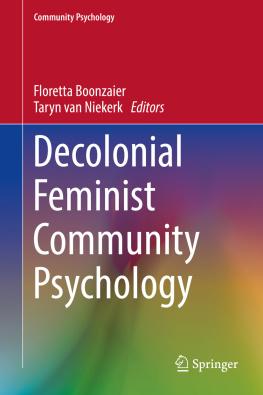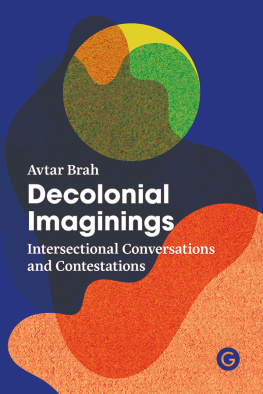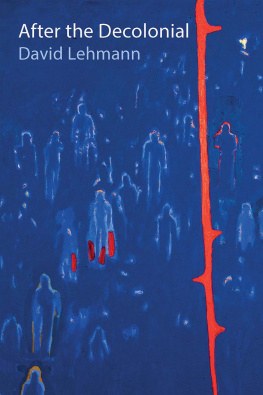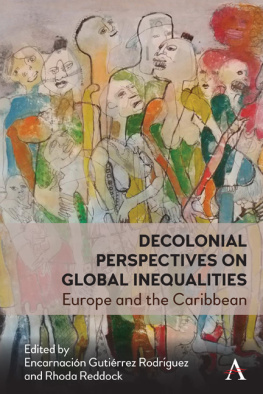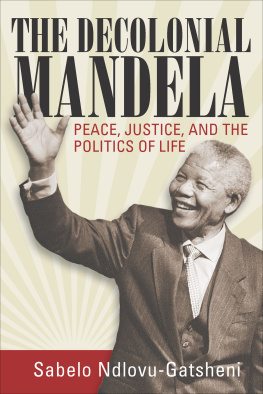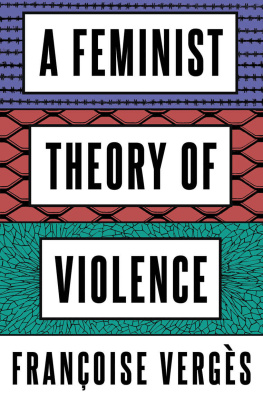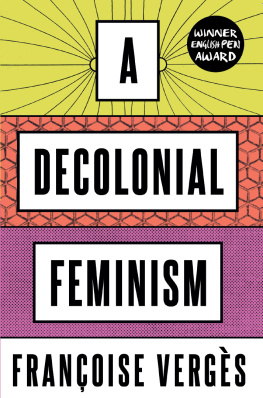Floretta Boonzaier - Decolonial Feminist Community Psychology
Here you can read online Floretta Boonzaier - Decolonial Feminist Community Psychology full text of the book (entire story) in english for free. Download pdf and epub, get meaning, cover and reviews about this ebook. year: 2019, publisher: Springer International Publishing, genre: Politics. Description of the work, (preface) as well as reviews are available. Best literature library LitArk.com created for fans of good reading and offers a wide selection of genres:
Romance novel
Science fiction
Adventure
Detective
Science
History
Home and family
Prose
Art
Politics
Computer
Non-fiction
Religion
Business
Children
Humor
Choose a favorite category and find really read worthwhile books. Enjoy immersion in the world of imagination, feel the emotions of the characters or learn something new for yourself, make an fascinating discovery.
- Book:Decolonial Feminist Community Psychology
- Author:
- Publisher:Springer International Publishing
- Genre:
- Year:2019
- Rating:4 / 5
- Favourites:Add to favourites
- Your mark:
- 80
- 1
- 2
- 3
- 4
- 5
Decolonial Feminist Community Psychology: summary, description and annotation
We offer to read an annotation, description, summary or preface (depends on what the author of the book "Decolonial Feminist Community Psychology" wrote himself). If you haven't found the necessary information about the book — write in the comments, we will try to find it.
Decolonial Feminist Community Psychology — read online for free the complete book (whole text) full work
Below is the text of the book, divided by pages. System saving the place of the last page read, allows you to conveniently read the book "Decolonial Feminist Community Psychology" online for free, without having to search again every time where you left off. Put a bookmark, and you can go to the page where you finished reading at any time.
Font size:
Interval:
Bookmark:
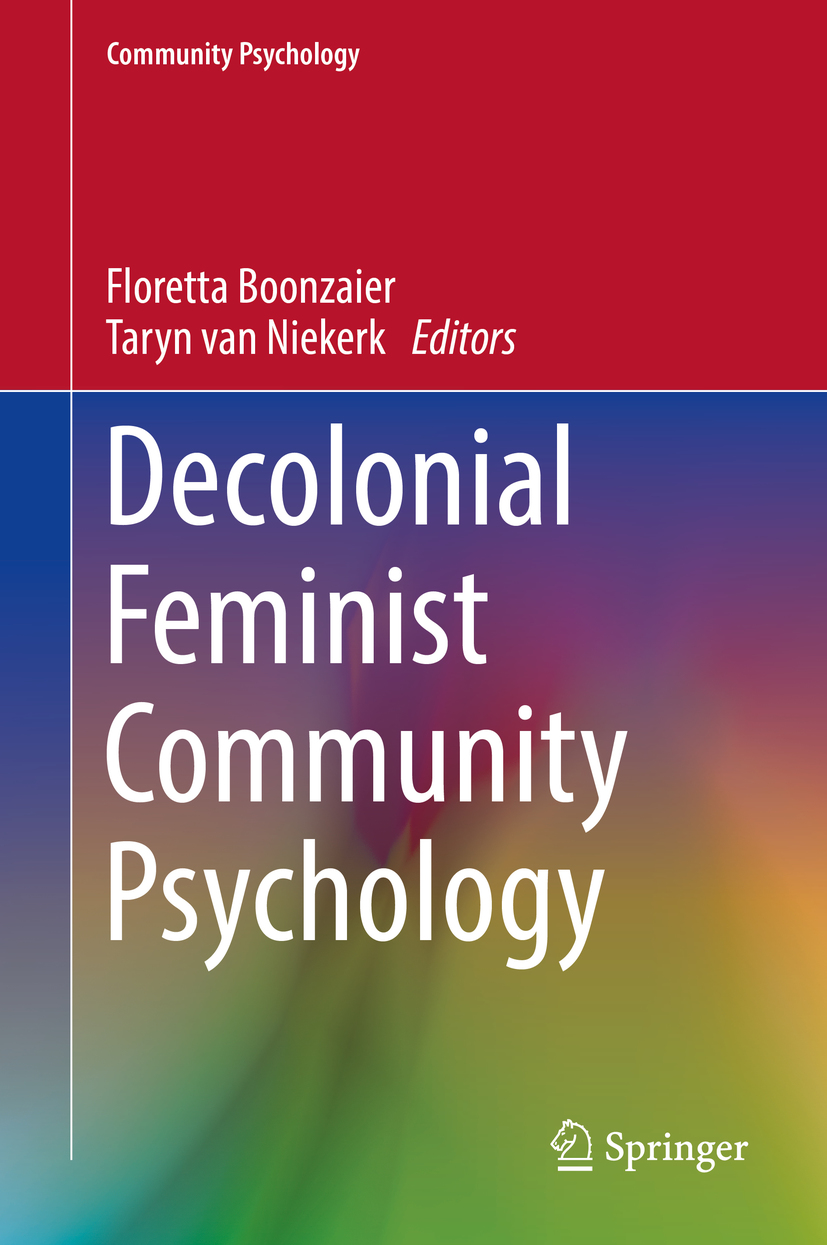
The Community Psychology book series is envisaged as a space to review the established assumptions and knowledge economy underlying community psychology, and encourage writings that recognize the plurality of people and the many geographical, psychological and sociological locations that they occupy. The book series will enable contributors to stimulate thought that questions that which is constructed as critical knowledges, community psychology, and the meanings of liberation and community. Contributions to the book series draw attention to the applications of community psychology in the Global South and the Global North as they relate to such issues as violence, socio-economic inequality, racism, gender, migration, dispossession, climate change, and disease outbreaks. In do so, it centers community psychology as focused on the well-being of collectives, and dealing with such focal issues as deploying psychology to support social justice, the relevance and appropriateness of its internal logic, and methods that deal with the range of psychological, social, cultural, economic, political, environmental, epistemic, and local and global influences that bear on the quality of life of individuals, communities and society. The book series concentrates thus on the following three key areas of focus: 1) decoloniality, power and epistemic justice, 2) knowledge production, contestation and community psychology, and 3) community psychology in context. The series is of vital and immediate relevance to researchers, practitioners, faculty and students from the intervention sciences, including anthropology, sociology, public health, development studies, social work and urban studies
More information about this series at http://www.springer.com/series/15965

This Springer imprint is published by the registered company Springer Nature Switzerland AG
The registered company address is: Gewerbestrasse 11, 6330 Cham, Switzerland
This work is dedicated to those countless feminist and decolonial scholars and activists who have come before us, those who are still with us and those who are still on their way.
This book was a collaborative effort, emergent from many conversations and engagements with our colleagues, friends, families and students, too many to mention. We thank you all. We would like to acknowledge all the contributors to this volume: Lutfiye Ali, Malvern Tatenda Chiweshe, Josephine Cornell, Brittany Everitt-Penhale, Shose Kessi, Peace Kiguwa, Catriona Macleod, Nick Malherbe, Haile Matutu, Jabulile Mary-Jane Jace Mavuso, Linda Mkhize, Puleng Segalo, Tamara Shefer, Shahnaaz Suffla, and Gabriela Tvara.
We extend our special thanks to the series editors, Mohamed Seedat and Shahnaaz Suffla, who provided the encouragement, enthusiasm and support for this work. We are deeply appreciative of Haile Matutus generous, meticulous and efficient labour as editorial assistant on this project. We would also like to acknowledge the importance of our engagements in the Hub for Decolonial Feminist Psychologies in the Department of Psychology at the University of Cape Town, especially to our friend and colleague, Shose Kessi, who is the co-director of the Hub.
We acknowledge the National Research Foundation (NRF) and the Mellon Foundation that provided us the financial support to travel, share and cultivate dialogue at various conferences around the volumes thematic focus. We also thank the University of Cape Town for the institutional support for the work.
A final and very special thanks go to Sean Daniels, Luke Daniels, Liam Daniels and Bjorn Christ for their love and support.
Font size:
Interval:
Bookmark:
Similar books «Decolonial Feminist Community Psychology»
Look at similar books to Decolonial Feminist Community Psychology. We have selected literature similar in name and meaning in the hope of providing readers with more options to find new, interesting, not yet read works.
Discussion, reviews of the book Decolonial Feminist Community Psychology and just readers' own opinions. Leave your comments, write what you think about the work, its meaning or the main characters. Specify what exactly you liked and what you didn't like, and why you think so.

